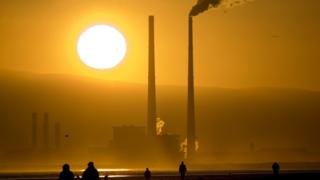
Image copyright
Getty Images
Ireland stands on the brink of putting climate change at the heart of its government if Green Party members vote in favour of a new coalition.
The new administration plans to ban fracked gas imports from the US, make steep cuts in emissions and end new drilling for oil and gas.
Agreed in talks with two larger parties, the plan now needs the support of two thirds of Green members.
But there is opposition, with some saying it is not progressive enough.
The results of voting are expected on Friday evening.
- Climate change tops public’s environmental concerns
- Ireland declares climate emergency
- Car surge could see CO2 rebound after Covid-19
- BP faces $17.5bn hit as it forecasts cheaper oil
Ireland’s reputation as a clean and green country has been tarnished in recent years by the inability of successive governments to tackle carbon emissions.
Image copyright
Getty Images
Compared to the rest of the EU, Ireland is the fourth largest emitter per capita.
An agreed EU target to cut carbon by 20% by this year was missed by a country mile.
The main problems have been in transport and agriculture, with a growing national dairy herd increasing by more than a quarter in the past five years.
Voter concern over climate change saw a significant improvement in Green Party representation in parliamentary elections held in February this year.
With no one winning an overall majority, the Greens’ 12 seats made them a key partner in coalition talks, with the two largest traditional parties, Fianna Fáil and Fine Gael.
Delayed by the Covid-19 crisis, negotiators eventually produced an agreed programme for government.
The issues of climate change and sustainability are at the heart of it.
The proposed cuts in emissions will be enshrined in a Climate Action law, which will define how five-year carbon budgets will be set.
This idea, which would see Ireland’s emissions cut by 51% by 2030, is similar to existing legislation in the UK, and has been welcomed by scientists.
Image copyright
Getty Images
“The achievement of the 7% annual cut in emissions would be a scientifically acceptable solution at least in the short- and medium-term for Ireland, given that we have been flatlining our emissions and failing to meet the targets we have signed up to,” said John Sweeney, emeritus professor of geography at Maynooth University.
“It has a very strong influence if you embrace the carbon budget principle. And I think that’s what will drive the achievement of reductions here so I am quite happy from a scientific point of view.”
As well as banning the importation of fracked gas from US shale production, the programme would stall any future oil and gas drilling in Irish waters.
The programme is likely to be approved by members of the two bigger parties – but the Greens’ high bar of two thirds support makes the whole project uncertain.
Some experts believe that failure to support the deal would be a calamity, as the programme, they argue, would usher in the greenest government in the history of the state.
Image copyright
Getty Images
“It’s completely transformational,” said John Gibbons, an Irish journalist and long time climate commentator.
“What this delivers is a quantum shift in Ireland’s climate response. A ban on fracked gas is incredibly important, as is the ban on oil and gas exploration, this is saying to the multinational fossil fuel industry, Ireland is now off limits.”
Despite the potential gains, within the Green movement there is considerable opposition from members who feel that it doesn’t address issues of social justice, housing and economic strategy.
“There’s a new generation of activists that believe in climate justice and they don’t feel that you can separate issues around housing, issues around finance, issues around taxation from environmental concerns,” said Neasa Hourigan, who is a new Green party TD (Member of Parliament).
While she helped negotiate the programme for government, she is now urging members to reject it.
“Until you address everything in terms of the fabric of how we operate as a society, then really what you’re doing is just compartmentalising something into one area and that’s not going to effect real climate action,” she told BBC News.
“It has to be system change instead of climate change.”
Image copyright
PA
With opposition from young people and members of the party in Northern Ireland, Green leaders have turned to Hollywood, enlisting actor and environmentalist Mark Ruffalo to encourage members to back the deal.
With the result said to be down to a handful of votes, there are worries that opponents of the programme based in the jurisdiction of Northern Ireland may scupper a plan that won’t directly impact them.
Some commentators are urging Green members to keep their eye on the bigger picture.
“In a climate emergency when your house is on fire, you deal with the emergency and then when that’s stabilised we’ll get onto all the other good stuff,” said John Gibbons.
“This is the best chance, it’s out of sight in terms of anything that’s ever been on the table.”
Follow Matt on Twitter.
Read MoreFeedzy


